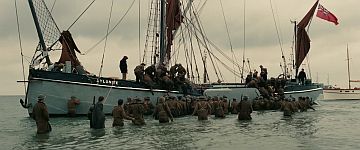
Adolf Hitler was many things.
Mass murderer.
Megalomaniac.
The world’s great orator.
But as a military tactician in 1940–the jury, to this date, is still out.
After their blitzkrieg through Eastern Europe, the Nazis then pivoted west and set their sights on France. Instead of an all-out frontal assault that the combined French and British Allied Forces expected, the Nazis instead conducted a classic military looping “end around” the permanent Maginot Line fortifications from World War I and quickly cut off the fast retreating British Armed Forces, stranding them with their backs to the ocean.
And nowhere to run.
The place was Dunkirk—spelled Dunkerque by the French—the title of this self-same World War II biopic by famed director Christopher Nolan
(“Inception”) who is lensing a remake to Ian McEwan’s “Atonement” from 2007 and Leslie Norman’s 1958 version starring Richard Attenborough.
As biopics go, the laws of nature must take hold.
This is not a “woulda, coulda, shoulda happened” film—that is what would have happened if the Nazi war machine had not suddenly stopped and merely encircled Dunkirk, preventing any Allied forces from getting out? As history shows—Hitler eventually agreed with his generals to halt the
German advance on the outskirts of this small French village that the British had evacuated its 200,000 soldiers—with an additional 140,000 Allied soldiers from Northern France—were forced to run to.
Rather the Battle of Dunkirk was a purely defensive battle and mass evacuation from May 26 to June 4, 1940.
History now tells us that the Nazis could have easily run right over the British at Dunkirk—(although it did absorb hundreds upon
hundreds of military equipment including badly needed vehicles and tanks)—capturing the bulk of its armed forces and leaving the island nation helpless on their home soil.
There is no doubt that millions of people today would be speaking German as their native tongue.
Instead, as presented by Nolan, we see the utter desperation and plight of the British forces, with nowhere to go and lain out on the empty beaches for
several days in which Hitler—instead of mowing over the British in an easy ground attack—instead relied on the Luftwaffe (the aerial warfare branch of the combined German Wehrmacht military forces) to unendingly machine gun down anything that moved on the beaches.
Here’s the official synopsis:
“It’s hard to grasp the unfolding disaster that was the 1940 Battle of Dunkirk. For nine days, Britain evacuated 200,000 of its soldiers—most of the United Kingdom’s trained troops—along with nearly 140,000 Allied soldiers, from Northern France with a fleet of naval vessels and appropriated civilian “little ships” while under near-incessant air attack. The German Army had split the Allied lines, pinning the British Expeditionary Force and the French and Belgian troops to the sea.
Without the rescue, Britain would have likely fallen to fascism with the rest of Europe. And until the shell-shocked troops began arriving in British ports, the public was largely unaware of what was happening.
Under air and ground cover from British and French forces, troops were slowly and methodically evacuated from the beach using every serviceable naval and civilian vessel that could be found.
At the end of this heroic mission, 330,000 French, British, Belgian and Dutch soldiers were safely evacuated.”
To say that the British forces were in a pickle would be the understatement of the century.
From a screenplay written by Nolan, the director’s focus is first placed squarely on the completely bleak and helpless situation the British and Allies faced.
Nowhere to run.
No food.
No water—except undrinkable sea water.
No hope.
Nolan’s second, and the most interesting focus of “Dunkirk,” is the incredible bravery of ordinary British citizens who answered their nation’s clarion cry for help and leaped into anything that floated–from tug boats to ferry liners. Given by the British the code name “Operation Dynamo” or the “Miracle of Dunkirk,” anything that could float, did float and immediately headed east across the English Channel by the hundreds.
A floating flotilla of civilians who quite literally “jumped into the fray” of a world gone mad.
Some of Hollywood’s brightest stars have also been called to action by the director/writer, including Nolan alums from his Batman trilogy series, Tom Hardy and Cillian Murphy, as well as veteran actor Kenneth Branagh (“Hamlet”).
Sorry Dear Reader, but in most cases, history is not a box of chocolates, covered in a giant pink ribbon.
Seventy-seven years ago, Dunkirk was bleak, dark and grim.
This is not a “sanitized” retelling of history for children.
British commanders had their soldiers stand at attention in long straight lines up and down the white sand beach, thinking it would make them a harder target for the German Luftwaffe to mow down.
Wrong!
Instead they are laid waste—cut into pieces by aerial machine gun fire—either standing still on the beach or attempting to swim the Channel for their collective lives.
For any lover of liberty, this is tough stuff to take. Wouda. Coulda. Shouda.
If the Germans hadn’t stopped their advance to the sea. If the French forces were not surprised and cut off in the early hours of the Nazi attack.
Wouda. Coulda. Shouda.
In “Dunkirk,” Nolan does an admirable job of presenting the personal history of the courageous soldiers and more important the average “joe” of whom hundreds braved the unimaginable to save their nation—with all its warts, frailties and pimples as if it just happened a few minutes ago and the collective world held its breath.
Watching on live TV.
We can all thank a Heavenly power that it didn’t.
Questions, comments or travel suggestions, write me at readingruffolos@gmail.com
Disclaimer: The comments uploaded on this site do not necessarily represent or reflect the views of management and owner of Cebudailynews. We reserve the right to exclude comments that we deem to be inconsistent with our editorial standards.


